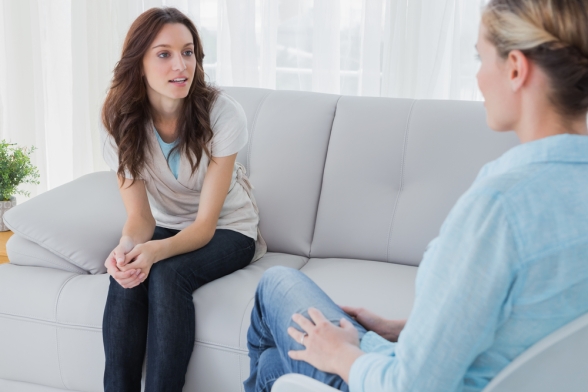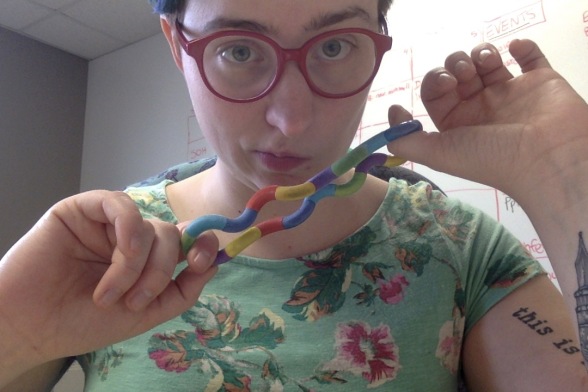I’d like to start this post by noting that while I mention ABA and the controversy over ABA, I hope that folks don’t focus exclusively on that as the point of this post.
There’s something that’s been festering in the back of my mind for a long time, a discontent with the autistic self advocacy community, a feeling that I do not belong there and that I cannot relate to many of the concerns of other autistics. I’ve never been able to put my finger on why I don’t feel quite right before. Until just this moment, when I saw a title of a talk that posited Trauma is an essential part of Autistic Identity.
And there it was. There was what I was missing. The bullying, the ABA, the mockery…when I read posts from other self advocates or talk to them in person, I find that they focus in a big way on traumatic experiences, often experiences in which they felt deeply othered by parents, peers, or teachers. Their way of being was seen as bad, and that is what has led to their advocacy.
Now I want to be very clear: talking about histories of trauma is important. Recognizing shared traumas is important. However what concerns me is making trauma a marker of identity. Trauma is not what makes us autistic. It is not an intrinsic part of being autistic. Ideally it’s something that we wouldn’t have to live with. And I have seen it used as a gatekeeping mechanism that says “if you don’t claim trauma as part of your history, you don’t get to talk about autism. You don’t get to talk about ABA. You must let the Real Autistics talk.”
In other areas I’ve seen suffering become a way to gatekeep. You’re not really queer if you’re not oppressed. You’re not really black if you can pass. In the asexual community, there have been discussions of whether we “count” as queer/LGBTQ because we haven’t experienced the same oppression that gay, trans, lesbian, or bi folks have. I’ve had little patience for it in other places, and in this case I finally feel as if I’m part of the “insiders” and can speak up without speaking over.
Maybe I don’t have to say this, but it absolutely is damaging when someone gets cut out of a community because they haven’t experienced “enough” oppression. It reminds me of people with eating disorders who believe they don’t deserve help because they aren’t “sick enough”. Everyone deserves to feel as if they are part of a community, and even if compared to other people in your community you’ve had a relatively easy go of it, you still deserve the support of knowing you’re not alone. All autistics experience ableism. Whether we have had a history of abuse or not, we all need a place to go that is understanding and welcoming. We all need to be able to talk about our experiences.
But beyond damaging the people who get cut out of the community or told that they need to shut up about their experiences, I think it does a disservice to people who are entangling their basic identity with trauma. I say this as someone who has a very deep relationship with mental illness and trauma, someone who knows what it’s like to be massively affected by negative experiences, and to feel that my identity has been altered at a basic level by the negative experiences I’ve had. But I firmly believe that entangling your basic identity with trauma limits your potential to actually move on and grow. It limits your ability to add other elements to your identity.
That sounds abstract. But when I was in the very deepest parts of my mental illness I rarely thought of myself as anything but anorexic. If someone asked me who I was or what I did or about myself, my first thought was “anorexic”. It was the default identity I had, and when I wasn’t sure about something, I would typically take the perspective of anorexic to understand it. That limited my ability to assimilate new information, it meant that when things challenged a perspective forged in pain, I discarded that new information. If trauma is always at the forefront of your mind, that is the lens through which you view the world. You see everything as a threat. It often means that if someone disagrees with you, you label them immediately as “source of trauma”. That does a lot of damage to you because you don’t get to see new perspectives, hear new information, and grow. You’re completely stuck with your brain still processing trauma over and over again.
Now all of this isn’t to say “oh it’s super easy to stop existing in a place of trauma”. That shit takes hard work. But right now what I’m seeing is that “trauma” as an identity and a perspective is being glorified among autistic self advocates. And it’s sad to me, because that is where I see the root of a lot of anger, fear, and confusion. If you’re not a part of the autism community right now, you may not know that there is some serious beef between parents of autistic kids/providers/teachers and autistic adults. I think there’s good reason for some of this beef, but in many cases you end up with people who have the same goal yelling at each other and feeling attacked. I’m concerned that the mindset of trauma is leading to it.
For example, many autistic adults experienced abuse in the form of “treatment” in their childhood. ABA has been and often still is incredibly abusive. As a response to those experiences, some autistic adults now say that all neurotypical parents of autistic children are abusive and all ABA is abusive. Let’s focus particularly on the first one, because I think it’s a more obvious example of what I’m talking about. I think most of us can find easy counterexamples to the statement “all NT parents of autistic children are abusive”. That’s an all or nothing statement that allows for no nuance and not only is fairly aggressive, but also shuts down and silences experiences of autistics who lived a different life. It says that a few people’s trauma is the final word on an issue.
And it concerns me because I have seen folks use their history of trauma to tell other autistics to shut up and sit down. I have seen the community condone that behavior and focus almost exclusively on trauma in a way that says these all or nothing, black and white statements are not only ok, but they’re important and necessary. There is no attempt to move beyond the hurt that was experienced, but rather a valorizing of those who have experienced trauma and a deference to every word they say.
Just because you have an experience doesn’t mean it’s true for everyone. And just because you are autistic and have experienced trauma does not mean people are not allowed to disagree with you. There is nothing bold and brave about holding tight to your pain and ignoring all new information. And as autistics, we should do better. We should know that we need to work on nuanced thinking because we tend towards black and white. We should know that we can struggle with theory of mind, and so we should work particularly hard to understand experiences (especially those of other autistics) that are different from our own. And if another autistic comes forward and says “hey, this wasn’t abusive for me”, we shouldn’t accuse them of lying or ostracize them. We’re losing valuable information about the breadth of experiences within autism.
There is no benefit to holding up a bar that says “you must be this traumatized to enter autistic spaces”. We can and should do better.





